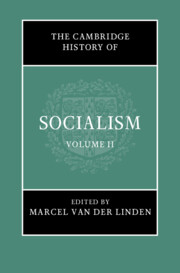Book contents
- The Cambridge History of Socialism
- The Cambridge History of Socialism
- The Cambridge History of Socialism
- Copyright page
- Contents
- Figures
- Maps
- Tables
- Contributors to Volume II
- Abbreviations
- Introduction to Volume II
- Part I Transforming State Power
- Social Democratic Routes in Europe
- Social Democratic Routes in Australia, the Americas, and Asia
- Worldwide Connections
- Southern Trajectories
- Left Socialisms
- 23 The London Bureau
- 24 European Left Socialist Parties since the 1950s
- 25 The New Left as a Global Current since the Late 1950s
- Part II Transversal Perspectives
- Index
- References
25 - The New Left as a Global Current since the Late 1950s
from Left Socialisms
Published online by Cambridge University Press: 03 November 2022
- The Cambridge History of Socialism
- The Cambridge History of Socialism
- The Cambridge History of Socialism
- Copyright page
- Contents
- Figures
- Maps
- Tables
- Contributors to Volume II
- Abbreviations
- Introduction to Volume II
- Part I Transforming State Power
- Social Democratic Routes in Europe
- Social Democratic Routes in Australia, the Americas, and Asia
- Worldwide Connections
- Southern Trajectories
- Left Socialisms
- 23 The London Bureau
- 24 European Left Socialist Parties since the 1950s
- 25 The New Left as a Global Current since the Late 1950s
- Part II Transversal Perspectives
- Index
- References
Summary
In the wake of the 1917 October Revolution and the First World War, when the Third (Communist) International got off the ground, the socialist movement underwent its first major split since becoming a mass movement in the last decades of the nineteenth century. The second significant rupture occurred about forty years later, affecting both Second International socialism and Third International communism. In the mid- to late 1950s, an international New Left suddenly emerged that captured the attention and imagination of several generations of activists, though it never came to the founding of a new international association that could have given added structure to the heterogenous forces of this New or Radical Left, which dissipated as an internationally relevant force in the course of the 1970s and 1980s.
- Type
- Chapter
- Information
- The Cambridge History of Socialism , pp. 584 - 614Publisher: Cambridge University PressPrint publication year: 2022



